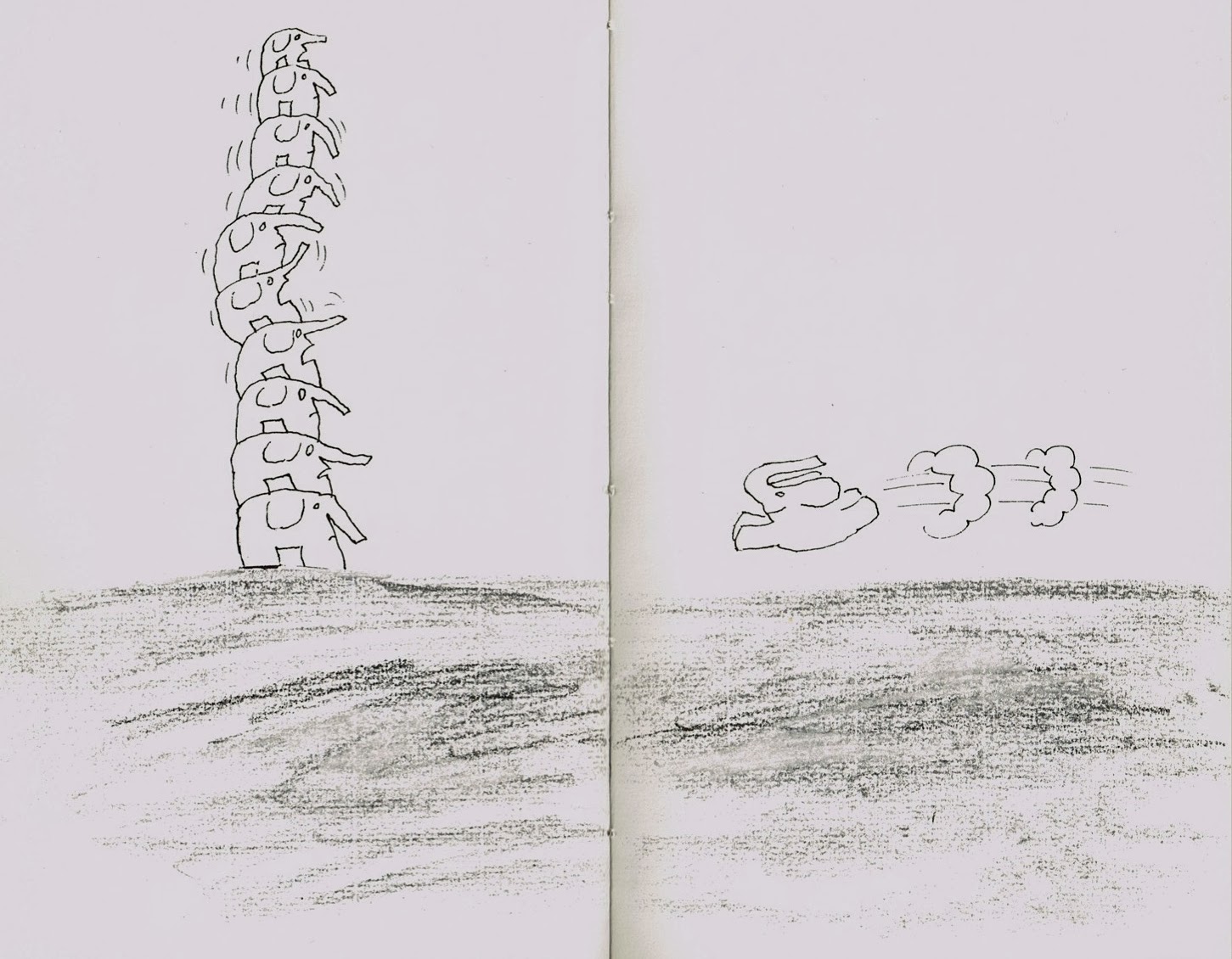Last week I came home to find a lovely little book in my mailbox from my friend Sylvie Morel. While browsing a bookstore in a nearby village, she came across the little volume and very kindly bought it for me. Not only is it a first edition, but it's in almost mint condition. Quite a nice find, if you ask me.
 |
| Front cover of Elephantasies by Friedrich-Karl Waechtner. Published 1966 by Dennis Dobson, London, U.K. ©1966 Verlag Barmeier & Nikel, Frankfurt, Germany |
Elephantasies is a strange but rather sweet little book filled with oddball drawings by the famed cartoonist. Not, I admit, that I'd ever heard of Friedrich-Karl Waechter myself, but my cartoon-o-phile friends will undoubtedly know right away who he is.
 |
| Friedrich-Karl Waechter around 2002. Source: http://www.faz.net/aktuell/feuilleton/ buecher/neue-frankfurter-schule-koenig-friedrich-der- zeichner-f-k-waechter-ist-tot-1252448-b1.html |
Waechter was born in Danzig (now Gdansk, Poland) in 1937. Following the Second World War, his family settled in Germany, where Waechter attended the Lauenburg Scholar School. Teachers immediately noticed his artistic abilities, and upon graduation he moved to Hamburg to study graphic art.
In 1962, he took a job drawing cartoons for Die Zeit in Frankfurt. His work attracted the attention of the fledgling satirical magazine, Pardon, and Waechter was offered a job. While with Pardon, he co-founded the New Frankfurt School, a collective of eminent cartoonists and writers of comics.
By 1966, he was writing books. Elephantasies seems to have been his first. Published in London in January 1966, Elephantasies is perhaps the only of his books to appear concurrently in English and German. Not that there are many words in either language in the book.
Waechter married and became a father, and by 1970 was writing children's books. From the descriptions I've read, they sound like very fun books, inviting readers to complete puzzles and drawings, write on the pages, cut things up and generally participate in whatever was going on in the story.
At the same time, even his children's books tended to be slightly subversive. He produced titles such as Der Anti-Struwwwelpeter, which mocked the story on which the movie Edward Scissorhands is based. Then there was Die Reise: Eine schrecklich schöne Bildergeschichte ("The Journey: A Terribly Beautiful Picture History"), in which a young boy is taken on a trip by a trio of slightly sinister men who show up at his door one day.
In 1979, Waechter co-founded the satirical magazine, Titanic, which featured his cartoons regularly until 1992. In that year, he decided to change gears slightly, switching his focus to teaching, writing books, and writing and directing plays. In addition, he created unusual sculptures, including a gigantic caterpillar perched in a tree, and Pinkelbaum, or "Peeing Tree".
 |
| Big Caterpillar by F.K. Waechter. Frankfurt, Germany Source: http://en.wikipedia.org/wiki/ File:Riederwald_pg_010.jpg |
Waechter died of lung cancer in 2005, at the age of 67. Over his lifetime, he wrote some 40 books and more than a dozen plays, in addition to innumerable cartoons—most importantly, of course, a welter of elephants.
Elephant Lore of the Day
I was going to write about something else here today, but I decided instead that this piece of lore from the original Elephant a Day blog was a better fit.The phrase "seeing pink elephants" refers to hallucinations caused by extreme drunkenness, and usually results from long-term alcoholism.
The first known use of the term comes courtesy of author Jack London, who in 1913's John Barleycorn describes "the man whom we all know, stupid, unimaginative, whose brain is bitten numbly by numb maggots; who walks generously with wide-spread, tentative legs, falls frequently in the gutter, and who sees, in the extremity of his ecstasy, blue mice and pink elephants."
A Wikipedia entry on pink elephants describes a story in Superman (Action Comics #7, December 1938), in which the Man of Steel lifts an elephant over his head at a circus. This causes a drunk in the audience to say, "I don't mind seeing pink elephants, but (-hic-) this is too much!" The same source also quotes Raymond Chandler's 1943 novel, Lady in the Lake, which refers to a doctor "who ran around all night with a case of loaded hypodermic needles, keeping the fast set from having pink elephants for breakfast."
And then there is the famous pink-elephant sequence in the 1941 Walt Disney film, Dumbo. Dumbo and his mouse friend Tim, having drunk water laced with champagne, hallucinate dancing and singing "pink elephants on parade". It's probably one of the most psychedelic sequences I've ever seen in a Disney film, outside of Fantasia.
 |
| A still from the "Pink Elephants on Parade" sequence in the Walt Disney movie, Dumbo (1941). Source: http://disney.wikia.com/wiki/Pink_Elephants |
Interestingly, hallucinations such as this are not the result of drunkenness itself, but are one of the symptoms of withdrawal. Alcoholic hallucinosis, or alcohol-related psychosis, develops twelve to twenty-four hours after drinking has ceased. It can involve both auditory and visual hallucinations, usually accusatory or threatening in nature. It comes on and goes away quickly—unlike its sister ailment, delirium tremens—and tends to occur in those with a history of long-term alcohol or drug abuse.
To Support Elephant Welfare







Isn't the 1,2,3,4 cartoon charming! What a nice gift from your friend. I learned a new word today from your blog. "welter" Where have I been all my life such that I've never heard of the word.
ReplyDeleteIt was a lovely gift indeed. And that's my favourite cartoon, too!
ReplyDelete